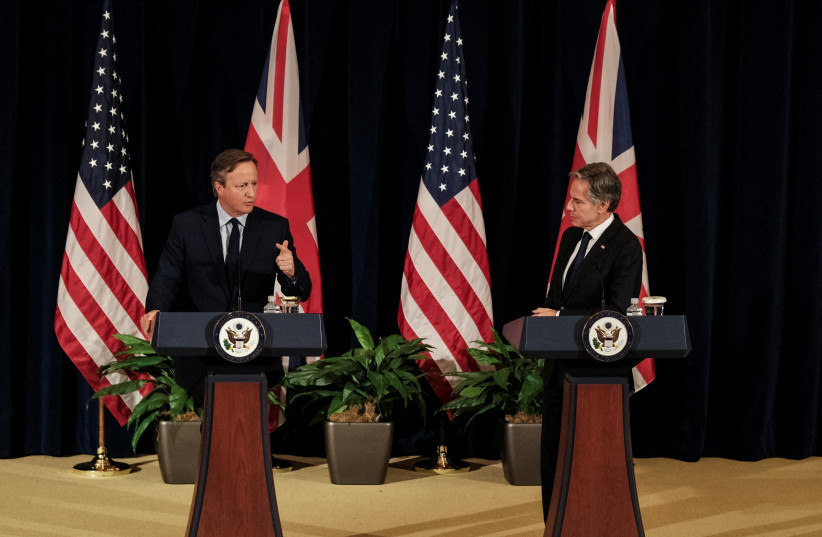The United States urged Hamas to accept the “serious” offer on the table for a hostage deal, as Israel’s security cabinet met and the terror group doused optimism that a deal was imminent.
“We have an offer that's on the table now...that is very serious and should be accepted,” US Secretary of State Antony Blinken said on Tuesday during a joint press conference with UK Foreign Secretary David Cameron.
“Hamas could move forward with this immediately and get a ceasefire that would benefit people throughout Gaza as well as of course get the hostages home,” Blinken said. Failure to accept the deal would show its continued disregard for the people of Gaza, he said.
“The ball is in Hamas’s court,” he stated, adding that “the world is watching to see what it does.”
He spoke after Cairo hosted indirect talks earlier this week, that included CIA Director William Burns as well as officials from Hamas, Israel, Egypt, and Qatar.

US National Security Adviser Jake Sullivan told reporters that the talks were a “marathon session that went late into the night” on Sunday.
Israel has shown flexibility in terms of what has been put on the table, Sullivan explained, but he noted that Hamas's public statements have been “less than encouraging.”
Sullivan said he had personally spoken with Qatari Prime Minister Mohammed al-Thani on Tuesday, who had explained that Hamas had not yet responded.
“I pressed him to try to secure an answer from them as soon as possible,” Sullivan stated.
What the world should say at this moment to Hamas is: It’s time. Let's go. Let's get that ceasefire. We're ready. I believe Israel is ready. And I think Hamas should step up to the table and be prepared to do so as well.”
At issue has been a six-week pause to the war in exchange for 40 out of the remaining 133 hostages, which the US hopes could be transformed into a permanent ceasefire that would see the return of all the hostages.
According to The Wall Street Journal, Israel would have to release 900 Palestinian security prisoners and terrorists from its jails, including 100 serving long-term sentences.
The WSJ said that the proposal would also allow Palestinians to return to their homes in the northern part of the enclave, which was heavily destroyed during the fighting between Hamas and the IDF.
Hamas says proposal does not meet its demands
Hamas said on Tuesday the proposal put on the table in Cairo this week did not meet its demands, but added that it would study the offer further and deliver its response to mediators.
"The movement (Hamas) is interested in reaching an agreement that puts an end to the aggression on our people. Despite that, the Israeli position remains intransigent and it didn't meet any of the demands of our people and our resistance," Hamas said in a statement following the latest ceasefire proposal.
Hamas wants any agreement to secure a permanent ceasefire, an IDF withdrawal from Gaza, and to allow displaced Palestinians to return to their homes across the small, densely populated enclave.
Israel won’t agree to a permanent ceasefire until it ousted Hamas from the enclave, a move which it said can only happen once it has conducted a major military operation in Rafah, in the southern part of Gaza.
In a confession he held with inductees into the Israeli army on Tuesday, Prime Minister Benjamin Netanyahu said “We have three objectives: One – to return our hostages, all of the field observers, and not just them, but everyone together. We will return them all. “
“The second objective: Eliminating Hamas. The third objective: To ensure that Gaza will never again constitute a threat to Israel,” he said.
Reuters contributed to this report.
